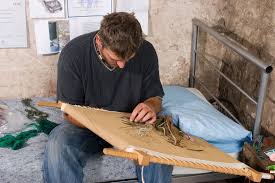Interiors: Fine Cell Work is a charity harnessing the sewing talents of prisoners to make exquisite embroidery

Walk into any of the upscale Firmdale Hotels in London or New York and you are struck by the confidence, colour and energy of the décor. There’s pattern, texture and embroidery everywhere. And if something catches your eye, there will often be a story behind it, but maybe it isn’t one you expected.
Whether it’s the Tree of Life headboard in the Haymarket Hotel, or the Blithfield lampshades at Ham Yard, these are made by Fine Cell Work (FCW), a charity and social enterprise that sends volunteer professional stitchers into 32 UK prisons to train inmates in embroidery, needlepoint and quilting.
Kit Kemp, Firmdale’s design director and co-owner, became involved with the charity around six years ago, the past three as a trustee, and collaborates on a FCW range of luxury handmade soft-furnishings – the Blithfield, Kit Kemp and Melissa Wyndham Collection, which is hand-stitched, finished entirely in prisons and available to buy.
“The collaboration fits us very well because of our love of craft, handmade pieces of furniture and upholstery,” Kemp says. “We have expanded the product base from cushions into more interior designed pieces, such as the headboard, footstool and embroidered mirror. Embroideries and handcrafted pieces can become heirlooms and treasured for generations.”
The aims are far-reaching: to give prisoners new skills, a work ethic, income, self-worth, contact with the world and the self-belief to stop offending, but also supports them, on release, with employment mentoring, qualifications and work experience.
It might come as a surprise that 95 per cent of Fine Cell Work’s stitchers are men, but this reflects the overwhelming majority of men in the UK prison population. Richard (not his real name), 59, has been volunteering in the FCW head office in Victoria as a production assistant for two and a half years.
In 2014 he began a 12-month sentence in Wandsworth Prison, serving six. He remembers the day he went into the FCW prison workshop, where they assemble the embroidery into finished products. “I walked into a very calm, civilised atmosphere, where you are called by your first name,” he says. “I loved it.”
For Richard, entering the prison system had been a thunderbolt. “The whole experience had turned my life upside down. I was in a cell by myself, 23 hours a day, with just a small TV.” From Wandsworth he was transferred to Brixton Prison, where he started quilting.
“With all the madness going on I was able to sit in my cell and stitch for eight hours a day. It was a lifesaver. My background is in mathematics, so this was a complete change. I had wanted to find a hobby when I retired but I wasn’t expecting to go down this route. The first weekend I was released I bought a sewing machine and started making cushions at home, as thank-you gifts for the people who had stood by me.”
Inside, FCW groups meet once or twice a month for a couple of hours where they can pick up new work, return things they have finished and get tutoring from the professional volunteers. A third of FCW’s turnover is paid to prisoners.
“There is something very calming about sewing,” Kemp says, “and for prisoners who are in their cells for so many hours, sewing is a blessing and a way of earning money. The crafted pieces are a source of pride to the person making them and to the person receiving them.”
Fine Cell Work’s pop-up shop is at 41 Pimlico Road, SW1, until July 19. For commissions, gifts and products visit finecellwork.co.uk